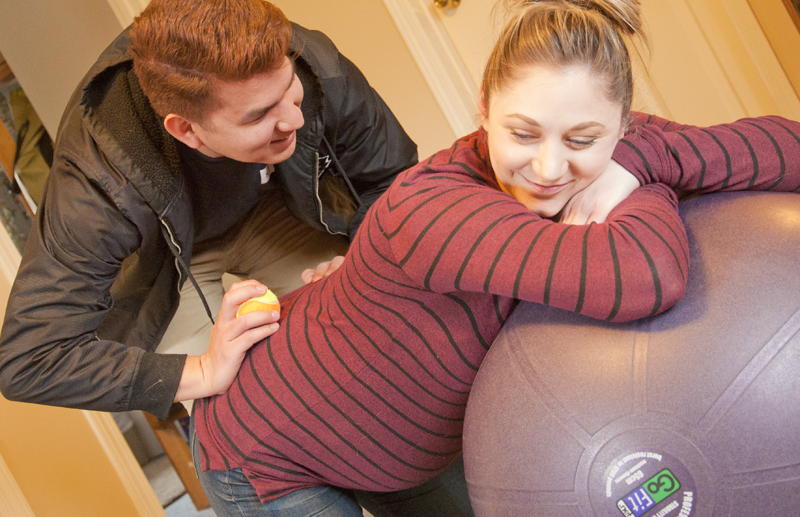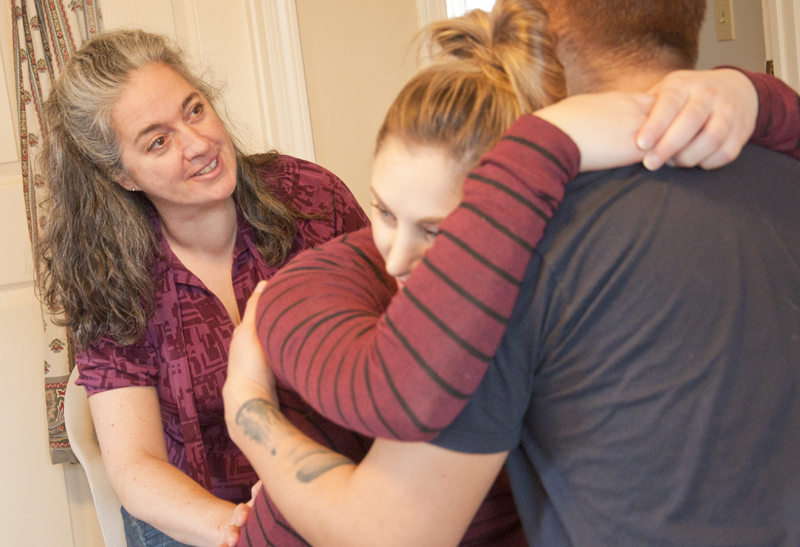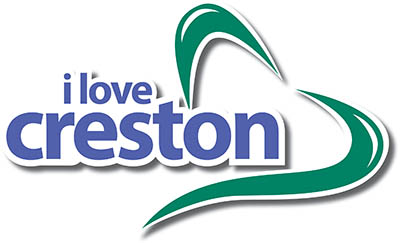
Mountain Valley Doula clients practicing techniques taught by Tara Mehrer. / BRIAN LAWRENCE
BY BRIAN LAWRENCE
I Love Creston Editor
For most Canadians, births are private events, with few other than the parents and medical staff present.
But that wasn’t the case with the first birth Tara Mehrer witnessed. From ages 16-19, she lived with her parents — her dad a teacher and mom a nurse — and sister in Haiti, where a birth was a sort of community event.
“My mom was the white nurse next door, and they said, ‘Want to come over and help?’ ” she recalls. “It takes a village to raise a child, and the support of a neighbourhood to birth a child.”
That had an impact on Mehrer, who now provides support to expecting parents through Mountain Valley Doula, a profession that grew out of being with her sister during labour.
“The first time I was in with someone was with my sister,” says Mehrer, who grew up in the Kootenays. “I was doing whatever I thought needed doing, just encouraging her, offering ice chips or a cool cloth for her forehead. And her doctor said, ‘You need to be a doula.’ ”
The role of a doula, derived from the Greek word for “servant-woman”, is to help expecting mothers develop a birth plan, teach relaxation, visualization and breathing skills useful for labour, and offer education on birth options. During labour, a doula helps create a secure, comfortable environment for mothers.
“I’m the emotional, mental and physical support,” says Mehrer. “I don’t advocate for options, but I do support them in whatever way they need to be supported. … It’s seeing women given a voice, empowering them to make their own choices in labour and delivery. I like seeing their confidence build up.”
That philosophy made giving her business a name a simple task.
“Mountains are strong and grounded,” she says. “In the valleys, there’s nourishment and support for the mountains.”
She recently began providing postpartum care, which may include assistance with breastfeeding, as well as light housework and meals preparation, essentially “mothering the mom”.
“All of a sudden, this crying, eating, pooping thing takes over your life,” she says.

Doula Tara Mehrer working with clients as they prepare for their baby’s birth. / BRIAN LAWRENCE
It took two years of training for Mehrer to become certified through Doulas of North America, and she’s now been one for 13 years. She continued her education through organizations such as the Childbirth and Postpartum Professional Association and the International Childbirth Education Association, and expanded her services six years ago by teaching prenatal classes, both to groups and individuals.
Unlike midwives, doulas are not classified as medical professionals and therefore can’t provide medical advice. But they may, if a client wishes, work closely with doctors and other specialists.
“I’m not there to oppose them or get in the way, I’m there to work with them,” says Mehrer. “It’s like a birth team.”
One of a doula’s goals is to provide clients with information regarding birthing options; the clients are then able to make informed decisions. The more parents learn, the more confident they become.
“You see the deer-in-the-headlights look at the first class, and then at the last class, they go, ‘We can do this,’ ” says Mehrer.
And they can do it with Mehrer by their side, a steady presence while nurses may come and go during shift changes.
“The doula is constant and always there,” she says.
During labour, she reinforces the lessons couples learned in classes, such as rhythm, ritual and relaxation, which may include everything from rocking to singing to walking — it’s different for everyone.
“Each woman copes with the pain in labour differently,” says Mehrer. “The pain in labour is something that your own body creates.”
Mehrer uses an acronym for pain in one of her classes: The pain in labour has a Purpose, it is Anticipated, it is Intermittent and it is Normal.
“You can’t control the contraction, but you can control how you respond to it.”
However a mother does that, Mehrer has seen firsthand how labour creates a special bond after the baby is born.
“If we learn to work with our bodies and allow that process to happen our bodies can build up endorphins, which are a natural morphine, and oxytocin, the love hormone. It can feel like a rush of love when a woman sees her baby for the first time.”
Through it all, Mehrer remains naturally composed, a state that developed during her years in Haiti, which included the 1986 uprising that overthrew then-president Jean-Claude Duvalier. Life in Haiti also made it easier to learn from her clients, each of whom is able to bring their own ideas and traditions into the birthing process.
“I think the experience of living in Haiti has made me more of an open-minded person,” says Mehrer. “I’m very interested in language and other cultures.”
And she’s always excited to see the joy on the faces of first-time parents.
“It’s not just a baby being born — it’s a mom and dad coming to life, as well,” says Mehrer.
•Learn more about Mountain Valley Doula at mvdoula.com or on Facebook.
